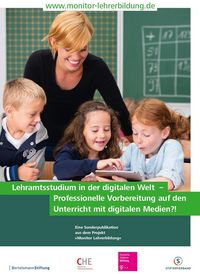Digital media in the classroom: training for student teachers not yet compulsory

Education experts are calling for student teachers to be taught how to work with digital media as a compulsory component of their training. This comes as a study by the organisation Monitor Lehrerbildung reveals that courses addressing the pedagogically meaningful application of tablets and smartboards are still not obligatory.
In order to promote the topic of digitisation and its significance the KMK (Standing Conference of the Ministers of Education and Cultural Affairs of the Länder in the Federal Republic of Germany) set a definitive goal in 2016 for German schools: pupils should have continuous access to digital learning environments and to the internet. This objective should be implemented by 2021. The effective use of tablets, smartboards and other digital media in the classroom requires appropriately trained teachers, who not only need media competence but also a didactic concept to ensure that the integration of digital media in their own lessons has a sound pedagogical foundation.
The Monitor Lehrerbildung investigated the extent to which these requirements are already included in teacher training courses by sending a questionnaire to state administrations and to teacher training colleges in the winter of 2017/2018.
Their findings: student teachers can currently complete their studies and qualify as a teacher without ever having encountered the subject of digital media. Relevant courses are an optional, rather than compulsory, part of studies at many colleges and universities. Mandatory courses addressing the subject of digital media were envisaged at only seven out of a total of 60 higher education institutions (for teachers training to teach at grammar school level).
Jörg Dräger, chair of the Bertelsmann Stiftung, is calling for the integration of digital media in the classroom to become a mandatory component of all school teaching qualifications, regardless of school type or subject. Digitally-supported learning can ultimately improve individual performance within heterogeneous groups of pupils. To what extent this potential is fully utilised depends heavily upon the competence of the individual teacher, ‘Digital media alone cannot guarantee successful learning outcomes: They must be integrated into lessons in a meaningful manner and must serve pedagogic objectives.’ said Dräger.
The study also reveals room for improvement at the level of the individual Länder. Only five federal states touch upon the subject in their examination regulations.
Education experts from the Monitor Lehrerbildung are also calling for improved networking between higher education institutions. The questionnaire reveals that only a third of the colleges and universities questioned currently consult or cooperate with other, similar institutions. The executive director of the Deutschen Telekom Stiftung, Ekkehard Winter, believes improved cooperation would be of benefit, ‘We can no longer allow higher education institutions to maintain an individualist mentality in this area of teacher training. (…) Promoting best practice across teacher training with regards to the implementation of such a central theme as digital media necessitates inter-regional cooperation between teacher training colleges.’
In order for teacher training and school practice to be compatible with one another in a rapidly changing digital world, education experts believe that strategic cooperation between teacher training institutions and schools should be fully supported.
Editorial staff (alb)
Sources
Information source: idw-online.de 23.05.18
Image source: idw.online.de